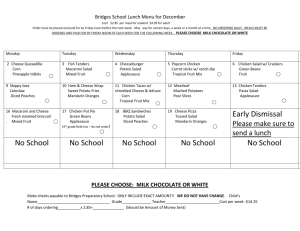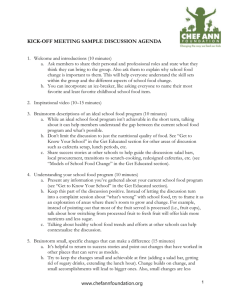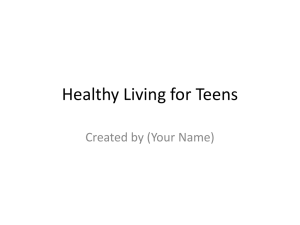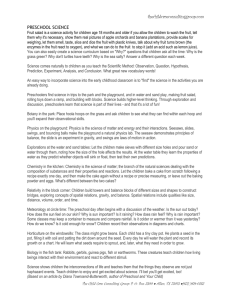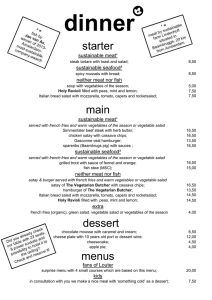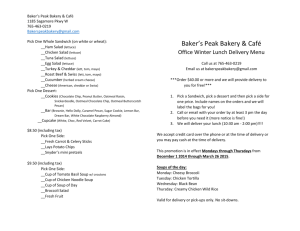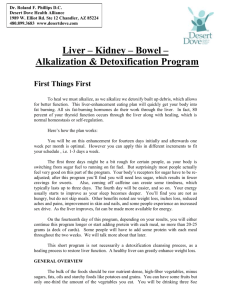Exercise and Nutrition If you`re exercising then there are two meals
advertisement
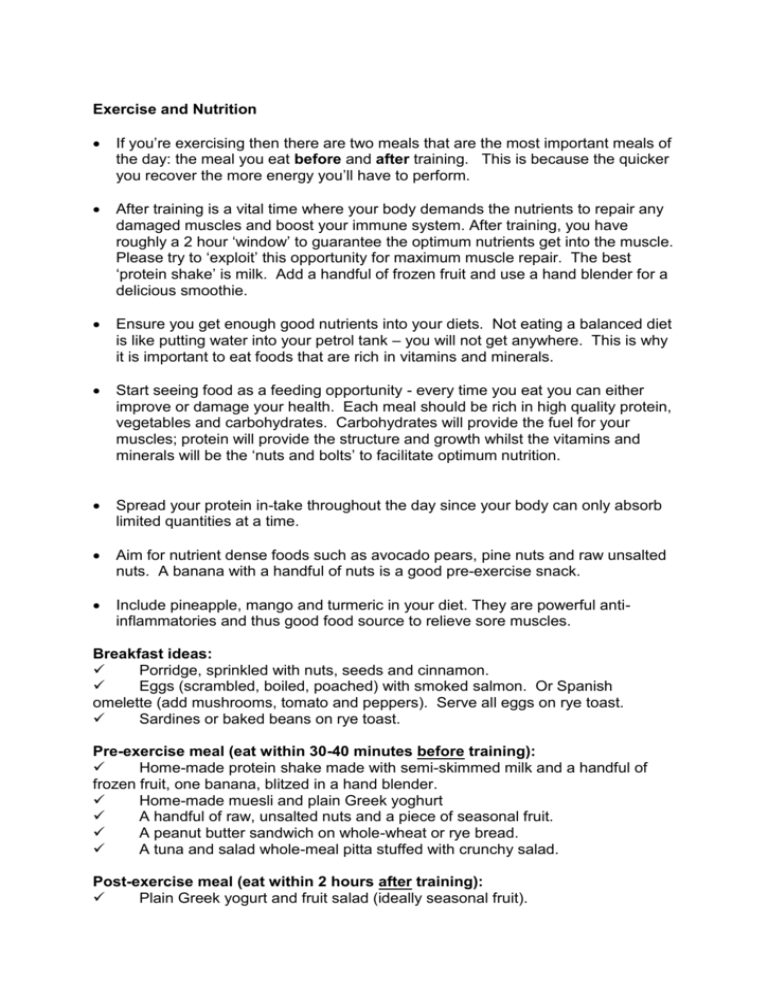
Exercise and Nutrition If you’re exercising then there are two meals that are the most important meals of the day: the meal you eat before and after training. This is because the quicker you recover the more energy you’ll have to perform. After training is a vital time where your body demands the nutrients to repair any damaged muscles and boost your immune system. After training, you have roughly a 2 hour ‘window’ to guarantee the optimum nutrients get into the muscle. Please try to ‘exploit’ this opportunity for maximum muscle repair. The best ‘protein shake’ is milk. Add a handful of frozen fruit and use a hand blender for a delicious smoothie. Ensure you get enough good nutrients into your diets. Not eating a balanced diet is like putting water into your petrol tank – you will not get anywhere. This is why it is important to eat foods that are rich in vitamins and minerals. Start seeing food as a feeding opportunity - every time you eat you can either improve or damage your health. Each meal should be rich in high quality protein, vegetables and carbohydrates. Carbohydrates will provide the fuel for your muscles; protein will provide the structure and growth whilst the vitamins and minerals will be the ‘nuts and bolts’ to facilitate optimum nutrition. Spread your protein in-take throughout the day since your body can only absorb limited quantities at a time. Aim for nutrient dense foods such as avocado pears, pine nuts and raw unsalted nuts. A banana with a handful of nuts is a good pre-exercise snack. Include pineapple, mango and turmeric in your diet. They are powerful antiinflammatories and thus good food source to relieve sore muscles. Breakfast ideas: Porridge, sprinkled with nuts, seeds and cinnamon. Eggs (scrambled, boiled, poached) with smoked salmon. Or Spanish omelette (add mushrooms, tomato and peppers). Serve all eggs on rye toast. Sardines or baked beans on rye toast. Pre-exercise meal (eat within 30-40 minutes before training): Home-made protein shake made with semi-skimmed milk and a handful of frozen fruit, one banana, blitzed in a hand blender. Home-made muesli and plain Greek yoghurt A handful of raw, unsalted nuts and a piece of seasonal fruit. A peanut butter sandwich on whole-wheat or rye bread. A tuna and salad whole-meal pitta stuffed with crunchy salad. Post-exercise meal (eat within 2 hours after training): Plain Greek yogurt and fruit salad (ideally seasonal fruit). Whole-wheat pasta with a good serving of whole protein (chicken, lamb or tuna). Baked potato, salmon and salad. Home-made protein shake made with semi-skimmed milk and a handful of frozen fruit, one banana, blitzed in a hand blender. Lunch and Dinner Ideas: Caesar salad or mixed bean and tuna salad > 3. Tuna, onion and bean salad Roast, grill and steam vegetables with a protein source such as chicken or beef Stir-fries (chicken, turkey, beef) loaded with rainbow colours of vegetables. Thai fish or chicken green curry BUT ensure the rice is brown or basmati! Snacks Ideas A handful of nuts and seeds (15 almonds and 2 Tablespoons of dry roasted pumpkin seeds). Low-fat cottage cheese with raw vegetables Plain, Greek yoghurt with added seasonal fruit. Raw vegetables dipped in humous Celery with peanut butter Hydration Research shows that athletes who are involved in physical activity for more than an hour and half can produce up to 3 litres of sweat per hour. That equals a loss of 3Kg of bodyweight. Thus fluid hydration is critical to sports performance. Did you know that if you are as little as 1% dehydrated during exercise your performance begins to decline. And 4% dehydrated can effect exercise performance by 20 to 30%. If you are training for 45 minutes or more you need to start sipping water 30 minutes into your training to ensure you do not get de-hydrated. Don’t wait until you feel thirsty. After training, hydrate with plain water. If you do drink a sport drink ensure it has 7% or less carbohydrate. Anything higher will reduce fluid absorption in the cells. The Night Before the Race day nutrition Please try any changes to your diet on a training day to see if these work for you and NOT on race day. The night before the race have a complex carbohydrate meal (whole-wheat pasta and chicken breast, brown rice with fish and vegetables/salad). Race day: Eat breakfast – include a little protein but eat more complex carbohydrates than usual. Drink water and avoid caffeine (including coke and other fizzy drinks) – but if you normally have coffee or tea in the morning – then have a cup – but a small cup. Eat your breakfast 2 hours prior to the race but each person is different (Some people have to eat 4 hours before a race to avoid getting a stitch). On race day ensure you drink from every water station – even if it is just a few sips. (And remember to experiment with the energy drink (provided on race day) on a training day – you don’t try anything new on race day). Carry on you a few jelly babies on training day and see how you get on with eating whilst running – the sugar will give you the extra energy for the last few miles when people tend to hit the wall – if it works for you then have them on race day). An hour prior to the race have some sips of ‘protein shake’ – For Goodness Shake or make your own with some frozen fruit, milk, water, nuts, (it must be a water consistency). You can also take a peanut butter and honey sandwich (on whole-wheat bread) as a pre-race snack – a good snack to nibble on prior to the race.
